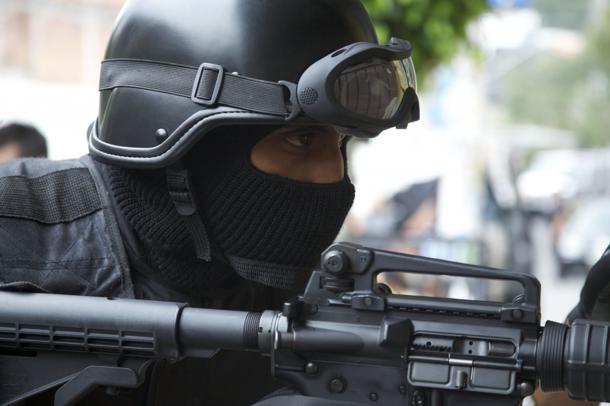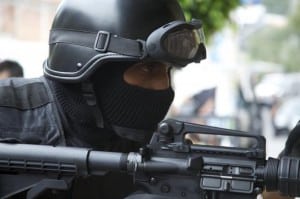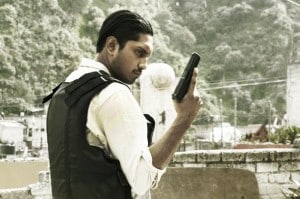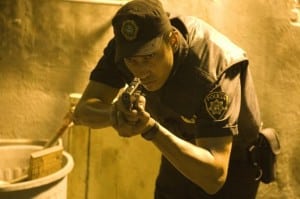
Director: Everardo Gout
Cast: Tenoch Huerta, Kristyan Ferrer, Carlos Bardem
133mins Crime Thriller
 Considering the vast display of passion and intensity within international football, it remains a relatively untouched territory in film. Mexican director Everardo Valerio Gout has picked up on its dramatic potential in Days of Grace, telling the disturbing tale of corruption and fervour in a broken society, set across three World Cups, all split four years apart.
Considering the vast display of passion and intensity within international football, it remains a relatively untouched territory in film. Mexican director Everardo Valerio Gout has picked up on its dramatic potential in Days of Grace, telling the disturbing tale of corruption and fervour in a broken society, set across three World Cups, all split four years apart.
We begin with Lupe (Tenoch Huerta), a law enforcer threatening young children for falling into trouble, before heading off to visit his wife and new born baby of his own. Fast forward a few years and one of the youths, Doroteo (Kristyan Ferrer) grows up and has dreams of becoming a boxer before he is pushed into a life of crime, getting involved in the capture of an innocent victim (Carlos Bardem), who is kept hostage and tortured. We weave in and out of these protagonists lives. amongst others, across 12 fateful years.
Days of Grace is an ambitious and creative piece of filmmaking, yet Gout can be accused of attempting too much in what is a convoluted and frenetic picture that will entertain the viewer but may also dumfound. Intertwining between three separate time periods is somewhat overbearing, as the differences between each World Cup isn’t palpable enough, and can become perplexing to audiences. Despite the fact Gout interconnects freely and intelligently, it certainly makes the viewer work hard. In short, Days of Grace is a tough watch.
 Using the World Cup as a backdrop has many emotional implications, and the three stories cleverly progress in tune with the tournament, so as we reach the latter stages of our tale, each World Cup also reaches its intense climax.
Using the World Cup as a backdrop has many emotional implications, and the three stories cleverly progress in tune with the tournament, so as we reach the latter stages of our tale, each World Cup also reaches its intense climax.
Gout ensures that the elation the football brings to the people works as a bittersweet emotion, counteracting against the bleak, mundanity of everyday life. It brings a perspective to proceedings as it shows how trivial the sport can in the grand scheme of things, while alternatively portraying how it can also prove to be a vital form of escapism. The realism of the piece in enhanced by the fact that many of us can remember where we were when Brazil won the 2002 World Cup, or when Zinedine Zidane was sent off for head-butting an opponent. These shared emotions allow us to experience a chilling relationship with the lead characters, and ensures that the bleak storyline has even greater impact.
 Meanwhile Gout must be commended for his unique approach to filmmaking with handheld camera work and out of focus techniques used so that we feel connected to the principal roles. When the hostage is beaten up, we see his tormentors through blurred vision, immersing us in the tale, as we even take on a first person perspective at times, as he hauntingly narrates his plight.
Meanwhile Gout must be commended for his unique approach to filmmaking with handheld camera work and out of focus techniques used so that we feel connected to the principal roles. When the hostage is beaten up, we see his tormentors through blurred vision, immersing us in the tale, as we even take on a first person perspective at times, as he hauntingly narrates his plight.
Though the characters are not particularly likeable the performances, especially Huerta, are impressive and full marks for originality in both the concept and the cinematic style. However the final execution is underwhelming, and the film is needlessly long – it should have taken a pointer from its football match counterpart and remained around the 90 minute mark. SP